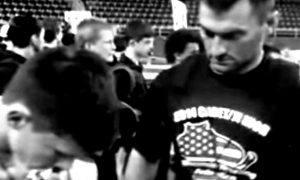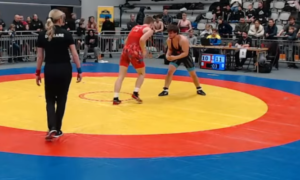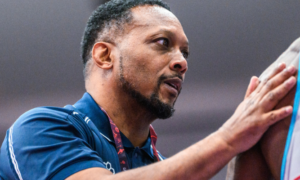With 2018 having just arrived, the Williams Baptist Greco-Roman team has inched closer to its official debut. The Bill Farrell Memorial, set for the last weekend of March in New York City, will represent the first major Senior competition for WBC Greco athletes, a milestone for the emerging program. Head coach Jonathan Drendel has 12 more weeks to work with in effort to prepare his squad and although he’s happy to have the extra time, he is also ready to break his wrestlers out of the holding pattern that has defined WBC’s inaugural season thus far.
In this edition of The Williams Word, Drendel talks about the current training plan in place at Williams and how he adjusts according to the wrestlers’ needs based on what he sees in the practice room. Also covered are Drendel’s takes on the jump in competition level present at the Farrell/NYAC Open as well as his approach to emphasizing personal accountability amongst his athletes.
5PM: What is practice going to look like as the NYAC tournament begins to come closer? Is there going to be a ramp-up period followed by a taper period, or is there a consistent training plan you’re adhering to?
Coach Jonathan Drendel: I think consistency in training is always a wise way to go about things. We will remain consistent in our training, but we will become more competitively-minded as we turn the corner towards the competitive system. We want these guys to be hungry when they go out on the mat — and they have been — but with this lull in competition, it’s easy to be complacent and it’s easy to settle into a routine. So there will be a little shaking up within the system that we’re running already.
But we don’t want to completely dismantle things, we don’t want to completely change what we have been doing. We want to work within the system that has proven itself and has gotten us to this point, while at the same time, up the ante. Dangle that carrot a little bit and be hungry to go out there and win matches.
5PM: Knowing that the rule change will be in effect when your guys compete, how do you split up practices? Is there a certain percentage divided between on the feet and on the mat, or do you put a heavier emphasis on par terre since that is typically seen as an American weakness?
JD: Par terre has always been a huge part of my training. Even before we knew the rules were going to change and forced par terre was coming back, we had a lot of focus on that. I wouldn’t say more than on the feet, it’s kind of on a week-to-week basis and how our guys are looking. It should work in tandem. You should be able to take a guy down and turn him, you should be able to wrestle a guy into a forced par terre position and be ready to continue wrestling. I don’t like to separate the two, they’re both wrestling and not two different entities. It’s a huge part of what we’re doing here. You can end a match real quick on top if you know what you’re doing and I want my guys to be prepared for that, prepared to score big points.
You look at the World matches and that is where they are scoring their big points. They’re looking to get on top and they are looking to score from there. It’s a huge part of our monthly training, I don’t necessarily break it up into weeks, I break it up more into months and cycles as far as as competition goes, but it’s probably just as important as our work on the feet is.
5PM: It sounds like although you adhere to a monthly training plan, there is a fluidity to the system, that you appraise the guys on a weekly basis and adjust the training plan based on what you’re seeing in practice. Do I have that right?
JD: Yeah, I do my practice plans ahead of time but they are always subject to change. I want to be analytical as a coach. We can’t be robotic in our training. I want to give these guys what they need, and I always reserve the right in our schedule to call an audible and switch up what we’re doing without ever dismantling the plan, because like I said, I spend a lot of time with these plans and making sure they’re what the guys need. Maybe instead of going over guts one day, we will work on our lifts and our lift-guts. But as far as structure goes, I am pretty rigid on that because I developed those with a purpose and goal in mind.
5PM: Different programs have a different way of handling this, but how do you go about ensuring accountability in your athletes pertaining to their individual training and and also, just their overall conduct in and out of the room?
JD: I think a big part of that again is just dangling that carrot and always reminding them why they are here and what they are doing. And at the same time, I expect their teammates to keep them accountable. We are a new team, but we also have some collegiate wrestlers on our team who have been on an elite level for a number of years. They understand the demands of the sport, they understand the need to give yourself fully to the sport, and they’re willing to step up and get in guys’ faces to say, You know what? You better knock that off. If they’re not, then I am coming to those guys and letting them know that, These are your brothers and you have to make sure they’re staying on track. Because if your practice partners aren’t doing what they’re supposed to be doing, it’s bringing down your performance, it’s bringing down your training partners.
They do a good job at that. They have their heads on straight and they understand why they are here. I bring guys into my program who want to compete, want to train, want to be at the next level, and if they’re not that way, they’re going to get exposed quickly and we’re going to make sure they get there, or they find the door.
5PM: It is probably going to be a more crowded Bill Farrell Memorial than usual due to its timing and the lack of events so far this year. Your guys are by and large neophytes, so how do you communicate to them the level they can expect to encounter in New York and how do you use your own prior experience to explain what it is that level looks like?
JD: That is really a difficult thing, you don’t know how hot the fire is until you touch it. At the same time, I’m trying to keep the bar in the room high, in all honesty, higher than they could reach because they are going to be thrown to the dogs when they step out there. It is not going to be an easy tournament, which is fine, nothing is easy at this level of competition. There is nowhere they are going to be able to go and just walk through things. I want them to be ready to face something that is above them. That is how they get better.
One of my focuses is making things hard in the room. We have been training at a very, very high level for a very long time, it’s basically all we’ve been doing. I have been trying to break them, trying to step them out of their comfort zones, push them beyond what they’re used to — just put them in situations where things are difficult so they will be ready come time for competition.
5PM: I’m sure your guys are pumped and would love to wrestle as soon as possible, but what about you? Do you wish the NYAC tournament was right away, or do you like the fact that you still have more time to get them prepped?
Coach Jonathan Drendel: I would say that it’s not ideal, I would prefer a competition sooner, but the schedule is what it is and we’re going to adjust and perform to what the situation is. There’s no sense in wasting time thinking about what could be, what should be, or what isn’t fitting our situation. We’re just going to train and get ready for what’s in front of us. Sure, I would love four or five more tournaments where I could go and get these guys some matches, but that’s not the situation we’re in. We are going to train for the situation we have and be ready for anything that comes.
Follow the Williams Baptist Greco-Roman team on Twitter and Instagram.
SUBSCRIBE TO THE FIVE POINT MOVE PODCAST
iTunes | Stitcher | Spreaker | Google Play Music | RSS


















